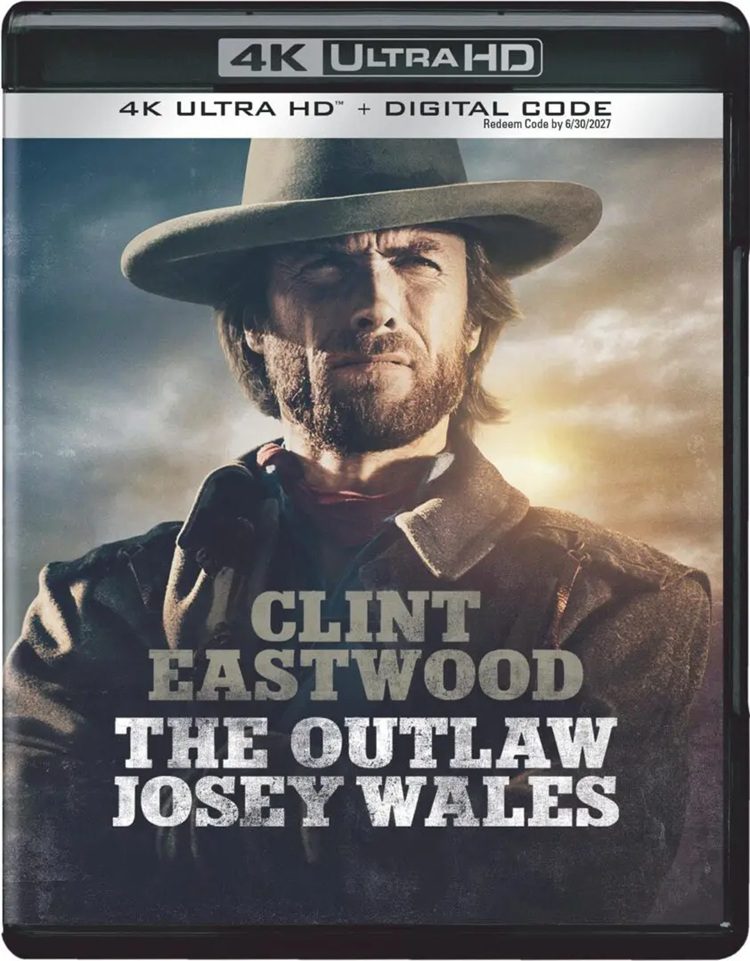
A Missouri farmer goes guerrilla after Union raiders kill his family—that’s the basic setup of The Outlaw Josey Wales (1976; dir. Clint Eastwood—who took over after firing co-writer Philip Kaufman). (“He’s an outlaw because you made him one, you damn redlegs!”—says nobody.) But what starts as a straightforward revenge Western ends more measured—a touch more thoughtful than expected. The movie’s bloody, but it carries a redemptive, even hopeful, note.
Buy The Outlaw Josey Wales 4K UHDWith a bounty on his head, Wales (Eastwood) moves through a broken country, picking up companions—stragglers and survivors scattered in the wreckage of the Civil War. Among them: a wry Cherokee elder (Chief Dan George) and a Kansas settler (Sondra Locke) whom Wales rescues from Comancheros. Together they form a kind of found family, though the movie doesn’t dwell on it. Later, Wales strikes a tentative peace with a Comanche chief, just as he and his band must fend off the same Union men whose brutality started Wales on his blood-soaked trail.
Wales isn’t so much a revisionist Western as a reconstructionist one. It’s a film about what happens after the war ends. Can we go home again? And in what shape? What’s the cost of survival? If this fucked-up world robs you of your reason to live, will anger sustain you for long? The film offers no simple answers—but it suggests that in kinship, in community, there’s something worth rebuilding.
The movie’s not sentimental, though. It’s got a heart.
Wales is still one of Eastwood’s sturdiest films as a director. It’s not flashy, but it wears the DNA of his two mentors: Don Siegel and Sergio Leone. Leone’s influence shows in Wales’ mythic framing—he’s a haunted, near-mythical gunslinger—and in the wide, unforgiving landscapes. But the violence is pure Siegel: short, blunt, eruptive. There’s no operatic grandeur, only messy consequences. The movie’s grit is real. It sees Wales as a man—not a symbol, not a superhero.
Wales, character-wise, is a more grounded cousin to the Man With No Name. As a film, Josey Wales offers a quieter, more affecting take on the Western than anything in Leone’s Dollars trilogy.
In places, the film sags—it meanders now and then—but it works. Beneath an elemental quest for vengeance is a hard-eyed validation of surrogate family—of tribal castaways and the fragile tribes they form. And as a showcase for Eastwood the actor, it excels. Rarely had he shown such range—grief, fury, protectiveness—all wrapped in the same man.
In The Outlaw Josey Wales, the myth of the gunslinger is intact.
He’s just tired.
As for the Warner Bros. 4K release: fine. The image is sharp—creases in the actors’ faces and lines in the land look weathered and crisp—and the sound mix is solid. Special features include an audio commentary by Richard Schickel, five featurettes (including Clint Eastwood’s West and Hell Hath No Fury: The Making of Josey Wales), and a documentary (Clint Eastwood: A Cinematic Legacy—Reinventing Westerns). Maybe I’m spoiled, but a film like this deserves more—deeper supplements, more archival depth. Still, let’s be thankful Warners didn’t tamper with that glorious Saul Bass logo.